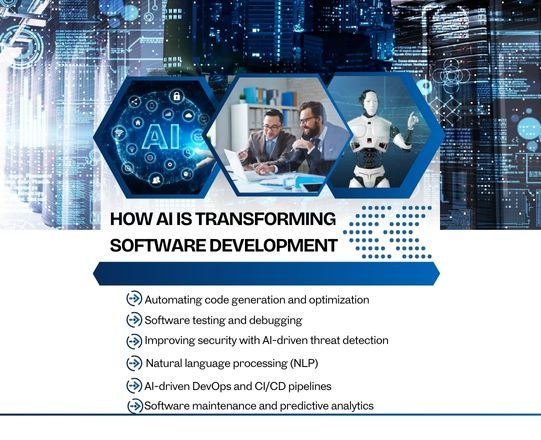
Artificial
Intelligence (AI) is transforming software development by redefining the way
applications are designed and maintained. By automating coding tasks, enhancing
security, and predicting system failures, AI is making software development
more efficient. Let’s explore how AI has been transforming software
development.
1.
Automating code generation and optimization: Automating code generation is one of the biggest advantages
of AI. Tools such as GitHub Copilot and Codex use AI-powered autocomplete to help
developers in writing code faster and without errors. These tools analyze the
context of the code and suggest relevant snippets, reducing development time.
2. Software testing and debugging: By automating test case generation and
identifying defects, AI testing tools such as Test.ai and Applitools are making
testing simple. They can simulate real-world user interactions, detect UI
inconsistencies, and perform regression testing. These tools use machine
learning models to analyze test results, detect patterns, and suggest changes.
3. Improving
security with AI-driven threat detection: AI-based security tools monitor software applications for
vulnerabilities, malware, and suspicious activities. The machine learning
models analyze data to detect anomalies and cyber threats. By integrating AI
into security workflows, developers can create robust software systems that offer
high security.
5. Natural language
processing (NLP): AI-powered
chatbots and virtual assistants help developers by answering coding-related
queries, explaining complex algorithms, and generating documentation also
enables no-code and low-code platforms, allowing non-programmers to build
applications using simple commands.
6. AI-driven
DevOps and CI/CD pipelines: By
automating continuous integration and continuous deployment (CI/CD) processes, AI
is optimizing DevOps workflows. The AI-driven tools analyze deployment logs,
predict failures, and recommend optimizations to improve efficiency. Integrating
AI into DevOps, organizations can enhance productivity, reduce manual
intervention, and speed up software delivery cycles.
7. Software
maintenance and predictive analytics:
AI can analyze system logs, performance data, and user feedback to predict
crashes. This allows developers to address issues before they impact users,
reducing downtime and improving user satisfaction. For large-scale
applications, AI helped with continuous updates and bug fixes ensuring the
software remains secure and up-to-date.
Conclusion: From code generation and testing to predictive maintenance, AI is making software development faster and more efficient. We at Mitiz Technologies help you to incorporate AI-driven development practices to stay competitive by using cutting-edge AI tools and frameworks.